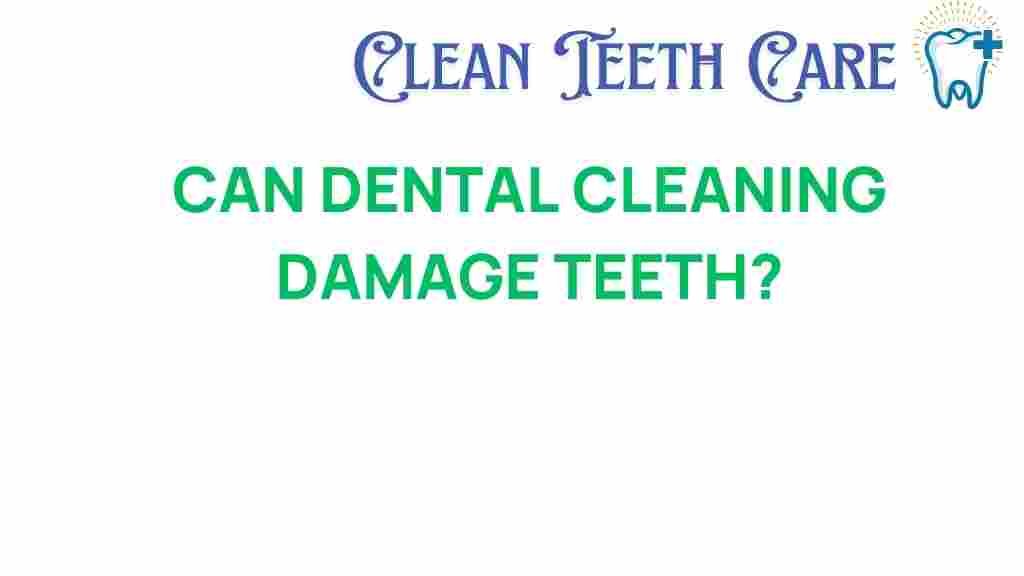The Hidden Dangers: Can Dental Cleaning Damage Your Teeth?
When it comes to maintaining oral health, regular dental cleaning is often touted as essential. Many people believe that routine cleanings are a surefire way to prevent cavities, gum disease, and other oral issues. However, misconceptions exist about the potential risks involved with professional cleaning, leading some to wonder: can dental cleaning actually damage your teeth? In this article, we’ll explore the truth behind these concerns, the importance of dental care, and how to ensure your hygiene practices are safe and effective.
Understanding Dental Cleaning
Dental cleaning typically involves a professional examination and a thorough cleaning of the teeth and gums by a licensed dental hygienist or dentist. This process usually includes:
- Removal of plaque and tartar buildup
- Pocket depth measurement around the teeth
- Scaling and polishing of the teeth
- Fluoride treatment to strengthen tooth enamel
These steps are crucial for maintaining oral health and preventing more severe dental issues down the line. However, some patients express concern about the effects of these procedures on their teeth.
Common Misconceptions About Dental Cleaning
Before diving deeper into the potential dangers, it’s important to address some common misconceptions surrounding dental cleaning:
- Myth 1: Dental cleaning weakens tooth enamel.
- Myth 2: Cleaning causes teeth to become loose.
- Myth 3: All dental cleaning procedures are the same.
- Myth 4: You only need dental cleanings if you have visible problems.
Understanding these myths can help alleviate fears and promote a healthier approach to dental care.
Can Dental Cleaning Damage Your Teeth?
While it’s natural to have concerns about any procedure involving your teeth, it’s essential to distinguish between actual risks and unfounded fears. Here are some factors to consider:
The Risks of Dental Cleaning
In general, when performed correctly by a qualified professional, dental cleaning is safe and beneficial. However, some potential risks include:
- Overzealous Scaling: Excessive pressure during scaling can irritate the gums.
- Improper Technique: If not done correctly, cleaning can cause enamel wear.
- Underlying Conditions: Certain health conditions may complicate the cleaning process.
Preventing Teeth Damage During Cleanings
To ensure that your dental cleaning is safe, consider the following preventive measures:
- Choose a Qualified Professional: Always seek care from a licensed and experienced dentist or hygienist.
- Communicate Your Concerns: Talk to your dental care provider about any worries you have regarding your teeth.
- Follow Pre-Cleaning Instructions: If your dentist gives you specific instructions before your appointment, be sure to adhere to them.
The Importance of Preventive Care
Investing in preventive care through regular dental cleaning can save you from more extensive and costly treatments in the future. Here are some benefits:
- Reduces Cavities: Regular cleanings help to remove plaque before it hardens into tartar, which is much harder to remove.
- Promotes Healthy Gums: Cleaning removes bacteria that can lead to gum disease.
- Early Detection: Dentists can identify early signs of dental issues during cleanings.
Step-by-Step Process of a Dental Cleaning
Understanding what happens during a dental cleaning can further ease your concerns:
- Initial Examination: The dentist or hygienist will first examine your mouth for any signs of problems.
- Scaling: Using specialized tools, the hygienist will remove plaque and tartar from your teeth.
- Polishing: After scaling, the teeth are polished with a gritty toothpaste to remove stains and smooth the surface.
- Fluoride Treatment: A fluoride treatment may be applied to strengthen enamel and protect against cavities.
This structured approach helps ensure that your teeth are cleaned thoroughly while minimizing any risk of damage.
Troubleshooting Tips for After Your Cleaning
After your dental cleaning, you might experience some sensitivity or discomfort. Here are some tips to manage these symptoms:
- Use Sensitivity Toothpaste: This can help alleviate discomfort.
- Avoid Hot or Cold Foods: Stick to room temperature foods for the first few days.
- Maintain Good Hygiene: Continue brushing and flossing regularly to keep your teeth healthy.
If sensitivity persists, consider reaching out to your dentist for further advice.
Dental Safety and Hygiene Best Practices
To maintain oral health and prevent issues between cleanings, adopt the following hygiene best practices:
- Brush Twice Daily: Use a fluoride toothpaste and a soft-bristled toothbrush.
- Floss Daily: This helps remove plaque and food particles from areas your toothbrush can’t reach.
- Limit Sugary Foods: Reducing sugar intake can help prevent cavities.
- Stay Hydrated: Drink plenty of water to help wash away food particles and bacteria.
- Regular Check-Ups: Schedule check-ups every six months or as recommended by your dentist.
Conclusion
In summary, while there are some risks associated with dental cleaning, the benefits far outweigh them when performed by a qualified professional. Understanding the process, addressing misconceptions, and following preventive care tips can enhance your oral health without causing teeth damage.
If you have more questions about dental care or concerns regarding your hygiene routine, don’t hesitate to consult with your dentist. For more information on maintaining good dental safety, you can visit this resource.
Remember, a healthy smile is a beautiful smile, and regular professional cleaning is a key component of maintaining that smile for years to come!
This article is in the category Hygiene and created by CleanTeethCare Team
